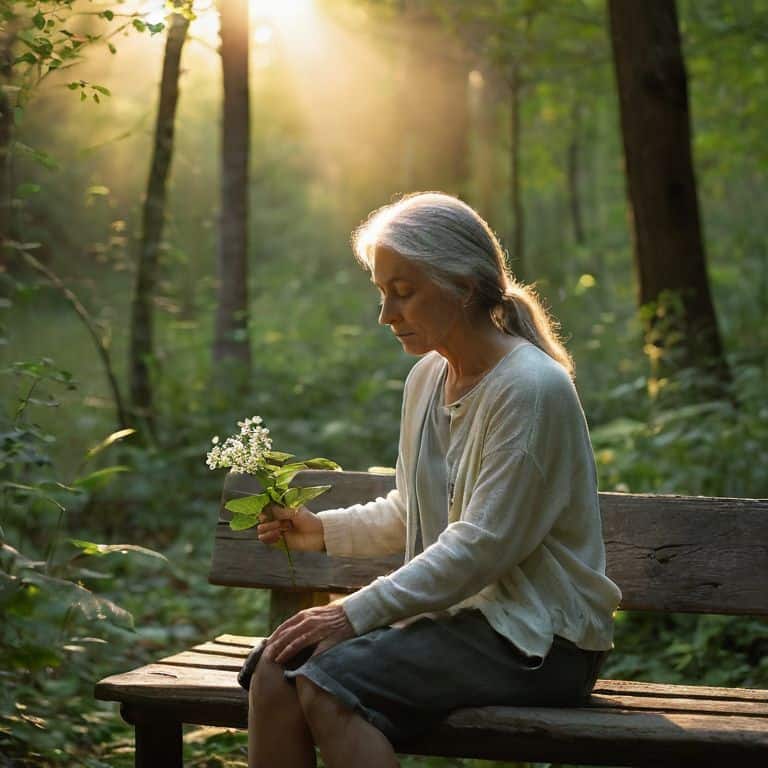As I sit in my Japanese rock garden, surrounded by the serene sounds of nature, I’m reminded of the countless times I’ve seen people struggle with how to deal with grief. It’s a topic that’s often shrouded in complexity, with many so-called “experts” offering overly complicated and expensive solutions. But I believe that’s just not true. In my 15 years of private practice, I’ve seen that the simplest approaches are often the most effective. I’ve lost count of how many times a 10-minute walk has helped my clients gain clarity on their emotions and find peace.
My goal is to provide you with honest and practical advice on navigating the difficult journey of grief. I won’t offer you any fancy techniques or promise a quick fix, but rather share with you the gentle and compassionate approach that has worked for my clients and me. As someone who has walked alongside many people through their darkest moments, I want to assure you that you’re not alone. In this article, I’ll share my personal story and the stories of those I’ve worked with, in the hopes that you’ll find comfort and guidance on your own path to healing.
Table of Contents
Navigating Grief

As we journey through the darkest moments of our lives, it’s essential to understand that coping with sudden loss is a unique experience for each individual. The bereavement process can be overwhelming, with emotional stages of grieving that seem to shift like the tides. One moment, we’re numb; the next, we’re consumed by sorrow. It’s crucial to acknowledge these feelings, allowing ourselves to process them without judgment.
In my experience as a therapist, I’ve seen the profound impact of finding support groups for grief. Sharing our stories with others who have walked similar paths can be a powerful catalyst for healing. These groups offer a safe space to express our emotions, receive guidance, and learn from others who have navigated the complexities of grief. By connecting with others, we can begin to rebuild our sense of purpose and find ways to honor the memory of our loved ones.
As we navigate this difficult terrain, it’s vital to prioritize self_care during the mourning period. Simple acts, like taking a 10-minute walk or practicing gentle stretches, can help calm the mind and soothe the heart. By incorporating these small moments of self-care, we can begin to find a sense of balance and peace, even in the midst of great sorrow.
Coping With Sudden Loss
When sudden loss strikes, it can feel like a storm has swept into our lives, leaving destruction in its wake. In these moments, finding calm can seem impossible. However, I’ve seen that even a brief moment of stillness can be a powerful catalyst for healing.
As we navigate the turbulent emotions that follow sudden loss, it’s essential to be gentle with ourselves. Allowing ourselves to feel the pain, rather than trying to suppress it, can be a crucial step towards healing.
Understanding Bereavement
As we explore the complexities of grief, it’s essential to recognize that bereavement is a unique experience for each individual. The process of mourning can be influenced by various factors, including personal relationships, cultural backgrounds, and past experiences.
I often find that allowing ourselves to feel the weight of our emotions is crucial in the healing process. Just as a river flows effortlessly around the rocks in its path, we too can learn to navigate our grief with a gentle and compassionate approach, taking it one step at a time.
Dealing With Grief

As we journey through the emotional stages of grieving, it’s essential to remember that everyone’s experience is unique. I’ve seen many individuals struggle to come to terms with their loss, and it’s crucial to acknowledge that coping with sudden loss can be particularly challenging. In such cases, allowing yourself to feel the emotions that arise, rather than suppressing them, can be a vital step towards healing.
Finding support during this difficult time can be incredibly beneficial. Self-care during the mourning period is not just about taking care of your physical needs, but also about nurturing your emotional and spiritual well-being. This can involve activities like meditation, yoga, or simply taking a 10-minute walk in nature to clear your mind. I often recommend that my clients explore finding support groups for grief, as sharing their experiences with others who have gone through similar situations can be a powerful way to process their emotions.
In my experience, managing grief in relationships requires patience, understanding, and open communication. It’s essential to recognize that everyone grieves at their own pace, and understanding the bereavement process can help you navigate the complex emotions that arise. By being gentle with yourself and others, you can create a safe and supportive environment to work through your grief, and ultimately, find a way to heal and move forward.
Emotional Stages of Healing
As we journey through the healing process, it’s essential to acknowledge the emotional ebbs and flows that we experience. Just like the seasons, our emotions can change, and it’s crucial to allow ourselves to feel and process each stage.
Healing is not a linear path, but rather a gentle unfolding, and it’s vital to be patient with ourselves as we navigate the dark moments, knowing that they will eventually give way to lighter, more peaceful times.
Finding Support in Mourning
As we walk through the journey of grief, it’s essential to surround ourselves with people who can offer a listening ear and a comforting presence. I’ve found that support groups can be a wonderful resource, providing a safe space to share our feelings and connect with others who understand our pain. Just as a tree grows stronger with the support of its roots, we too can find strength in the company of others who have experienced similar losses.
In my experience, leaning on loved ones can be a powerful way to navigate the darkest moments of grief. Whether it’s a family member, a close friend, or a therapist, having someone to talk to can help us process our emotions and find a sense of peace. Just as a gentle stream can wear away the roughest of rocks, the gentle support of loved ones can help smooth out the rough edges of our grief, allowing us to heal and find our way forward.
Key Takeaways for Healing
Allow yourself to feel the pain of grief, just as a river allows itself to flow around the rocks in its path, remembering that it’s okay to not be okay
Find your own rhythm of healing, whether it’s through walking, creative expression, or simply being in nature, and don’t compare your journey to others
Remember, grief is a journey, not a destination, and with patience, kindness, and the right support, you can find peace in the midst of pain, just as a garden finds beauty in the changing seasons
A Gentle Reminder
Just as a tree grows stronger with each passing season, our hearts can heal and find peace again, not by erasing the pain of our losses, but by learning to gently hold it, one breath at a time.
Dr. Samuel Cole
Finding Peace in the Midst of Sorrow

As we’ve navigated the complex and often painful journey of grief together, I hope you’ve found some comfort in the understanding that you’re not alone. We’ve explored the emotional stages of healing, from the initial shock of loss to the gradual process of finding ways to cope with sorrow. It’s essential to remember that grief is a unique and individual experience, and there’s no set timeline for healing. Allow yourself to feel the emotions that arise, and don’t hesitate to reach out for support when you need it. Whether it’s a trusted friend, family member, or mental health professional, having a supportive network can make a significant difference in your journey towards healing.
As you continue on this path, I want to leave you with a final thought: healing is possible, even in the darkest of times. It’s a process that requires patience, self-compassion, and gentle kindness towards yourself. Remember that grief is not something to be overcome, but rather something to be lived with, and ultimately, learned from. Just as a tree grows stronger after weathering a storm, you too can emerge from your sorrow with a deeper understanding of yourself and the world around you. Take a deep breath, and know that you are strong enough to navigate this difficult time, one step at a time.
Frequently Asked Questions
How can I process my emotions in a healthy way after losing a loved one?
Let’s take a gentle walk through this together. Allow yourself to feel whatever arises, just as a river allows its waters to flow. Notice your emotions, but don’t judge them. Take a deep breath in, and as you exhale, imagine any tension or pain leaving your body. Remember, healing is a journey, not a destination.
What are some self-care practices that can help me cope with grief on a daily basis?
As I tend to my Japanese rock garden, I’m reminded that gentle care can soothe the soul. For daily coping with grief, try simple self-care practices like a 10-minute morning walk, journaling your feelings, or a warm bath to calm your mind and body. These small acts can bring peace and clarity to navigate difficult emotions.
How can I know when it's time to seek professional help for my grief, and what kind of support can I expect from a therapist?
If you’re finding it hard to navigate daily life or feelings of grief are overwhelming, it might be time to seek help. A therapist can offer a safe space to process emotions and develop coping strategies. I encourage you to take that first step – a gentle conversation can be the start of healing.
